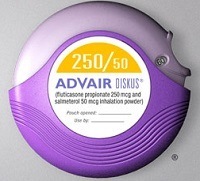 GlaxoSmithKline's asthma drug Advair is hard to copy. The British pharma ($GSK) has said it time and again, and recently, generics giant Teva backed up that claim, saying producing a generic would be too difficult before 2018. Some companies have given up on generic Advair, while others have shied away altogether despite the substantial sales up for grabs. But what if generics makers had some help--and an expedited review process--from the FDA?
GlaxoSmithKline's asthma drug Advair is hard to copy. The British pharma ($GSK) has said it time and again, and recently, generics giant Teva backed up that claim, saying producing a generic would be too difficult before 2018. Some companies have given up on generic Advair, while others have shied away altogether despite the substantial sales up for grabs. But what if generics makers had some help--and an expedited review process--from the FDA?
According to Leerink Swann analyst Jason Gerberry, that's exactly what's in the works. At this week's Generic Pharmaceutical Association (GPhA) conference, the agency announced plans to aim for a 10-month review on copies of complex drugs like Advair. It also said it's working with those companies looking to produce a rival to make sure they're on the right track.
The FDA "is actively dialoguing with prospective generic filers in order to ensure they adequately understand the pathway," he wrote in a note to investors. And while generic drug user fees do not cover pre-Abbreviated New Drug Application meetings with the FDA, the agency is making an exception for Advair, given the difficulty of copying its Diskus inhaler technology.
While that's great news for generics makers eager to get in on a piece of the $7.7 billion in revenue Advair scored in 2012, it's bad news for Glaxo. Advair, its top-selling product, accounts for about a fifth of its yearly revenue. And while the pharma giant has worked to bolster its respiratory franchise with new product Breo Ellipta and another, Anoro, awaiting FDA approval, that's a large chunk of change to make up.
The news from the FDA follows draft guidance it put out in September allowing for approval of Advair copies with only a short clinical trial and preclinical tests that analysts dubbed as "relatively basic." The guidance spooked GSK investors, sending shares down as much as 3.6%. But Teva reassured them the following month, saying it didn't expect true substitutes to hit the market before 2018.
As Gerberry notes, reviewing complex generics is a high-priority use of generic user drug fees, and the FDA has addressed "bioequivalence guidance for a number of complex products" lately. Glaxo is not the only company that stands to lose big with a simplified generics pathway; copies of Allergan's ($AGN) dry-eye treatment Restasis, which pulled in $792 million last year, won't have to go through clinical trials if the FDA sticks to the draft guidance it put out in May. Gerberry says guidance for Teva's ($TEVA) top-seller Copaxone may be next. That drug already saw its patent protection shortened from November 2015 to May of next year, sending the already-struggling company into turmoil; CEO Jeremy Levin made his exit earlier this week amid a board squabble over layoffs, part of a larger plan for cost-cutting.
Special Report: The 15 best-selling drugs of 2012 - Advair/Seretide